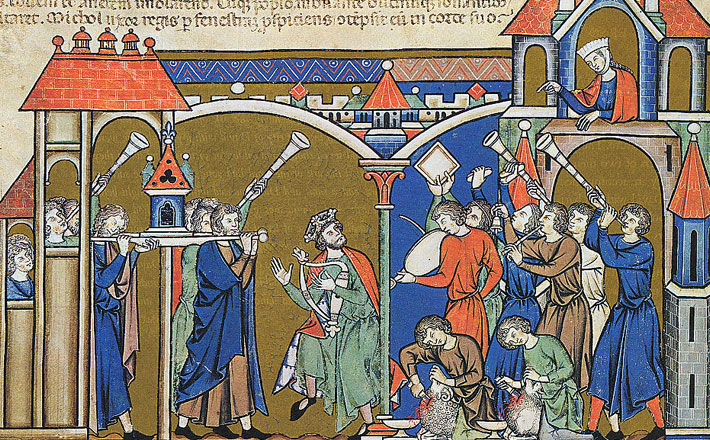Commentary on Psalm 85:8-13
Psalm 85 is a communal prayer for help and verses 8-13 express confidence that the help prayed for will indeed come.
Thus, the lectionary reading comprises the portion of the psalm that announces and describes the coming of salvation. It is set within the larger context of complaint and petition. At the beginning of the psalm the community remembers how in the past God turned from his “hot anger” (v. 3) and restored their fortunes. Now they pray that the Lord will restore them again (v. 4). They petition God with the questions of whether God will persist in wrath toward them (v. 5) or revive them (v. 6). The petition uses language common to the Psalter: “show us your steadfast love, O Lord, and grant us your salvation” (v. 7; see Psalms 106:1; 107:1).
The prayer for help the community offers in verses 1-7 is generic. It could apply to nearly any situation of trouble the community experienced. For example, the prophet Haggai used the same verb as Psalm 85:1a (“showed favor;” Hebrew ra?ah) when he complained about the people’s failure to rebuild the temple.1 As in Haggai’s time, the ones who pray Psalm 85 remember being restored, but they are currently languishing. The language of petition in the psalm, however, could fit any number of experiences in Israel’s history. What is most certain is that the salvation prayed for in verses 1-7 is promised in verses 8-13.
Verse 8 marks a transition from complaint (vv. 1-7) to assurance that God will save (vv. 9-13). This verse likely represents the voice of a priest or prophet who served as part of the personnel of the worship place. After the prayer for help uttered by worshippers, this worship leader invites the hearing of God’s word and reminds worshippers of God’s certain response to their prayer. The promise is that God will “speak peace.” Peace here translates the Hebrew term shalom. The word in some contexts means peace in the sense of absence of conflict or war (Joshua 9:15). In this verse, however, shalom seems to connote something like “welfare” or “prosperity” or perhaps simply “goodness.” What the Lord will speak will be good news because it will promise salvation (v. 9). The announcement of salvation is similar to that in Isaiah 40-55, which declares to the people who have experienced defeat and humiliation that God’s deliverance is at hand.
Verses 9-13 further promise and describe what God’s salvation will be like. Verse 9 may be read as a continuation of verse 8 in that it declares that salvation is coming. It begins with an emphatic particle (“Surely;” Hebrew ak) and the assurance that salvation is “at hand.” Salvation is available for “those who fear,” that is, those who humbly look to God for deliverance.
Salvation is portrayed as the work of four attributes of God’s presence, which James Luther Mays rightly refers to as “salvation powers.”2 The powers are “steadfast love,” “faithfulness,” righteousness,” and “peace.” The first of these is the covenant love and faithfulness God shows to God’s people (Hebrew hesed). Israel often cries for “steadfast love” in times of hardship and uncertainty (Psalms 89:49; 90:14). It is the ultimate sign of God’s favor and faithfulness, evidence that God is true to the promises he made to his people. “Faithfulness” (emet) is God’s reliability, which complements and defines further “steadfast love.” The love Israel knew in relationship with God was always faithful; they could rely on it.
The third and fourth terms form another pair that logically belongs together. “Righteousness” means more than simply “what is right.” It represents the essential character of God by which God created and maintains the world. Thus, Psalm 97:2 declares that “righteousness and justice are the foundation of his throne,” and Psalm 5:8 asks to be led through trouble by God’s righteousness. “Peace” appeared in verse 8 as a label for what God would speak to the people in need of salvation. In verse 10, and paired with “steadfast love,” however, shalom seems to have the more common meaning of “wholeness” or “completeness.” Like steadfast love, shalom here represents the just order of the creation.
These “salvation powers” work together in dynamic fashion and have an impact on all realms of existence. The salvation they bring will be observed on the ground and in the sky (v. 11). It will be experienced as both a spiritual and physical realty. As a result of the Lord’s gift of “what is good” (v. 12), the earth will flourish and will yield food in abundance. The picture is one of complete harmony and fulfillment of what God intended the world to be (“righteousness and peace will kiss each other,” v. 10).
The salvation promised here is much more holistic than what many modern people envision. For many, salvation is experienced as inner contentment, as a spiritual reality. Psalm 85 suggests, however, that the salvation of human beings is part of God’s work to reconcile all of creation to God’s self. The full realization of such salvation can only be accomplished with the coming of God to bring the world to fruition. It is eschatological. It is not surprising therefore that the church has always seen the powers of salvation described here especially at work in Jesus Christ. The prologue to John’s gospel says it particularly well: “grace and truth came through Jesus Christ” (John 1:17). Also, as the Apostle Paul declared, “in it (the gospel of Jesus Christ) the righteousness of God is revealed” (Romans 1:17).
Notes:
1 J. Clinton McCann, Jr, “The Book of Psalms,” NIB, vol. 4, p. 1016.
2 Psalms (Interpretation: A Bible Commentary for Teaching and Preaching; Louisville: Westminster John Knox Press, 1994), p. 277.


July 12, 2015